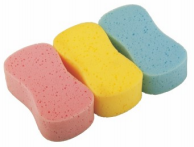
Scouring Pads are also usually a go-to in the kitchen, meaning they should often be used in the bathroom and elsewhere that has tough stains, grease, grime, and other substances that are usually difficult to clean off. However, cleaning tough stains and scouring pads is not innocent as they can harm and injure. While they are definitely effective, their use has profound risks. Therefore, it is crucial to learn how to easily and fully utilize scouring pads without hurting yourself and the objects around you. This essay specifically focuses on the best practices and precautions that should be taken while cleaning tough stains with scouring pads.

1. Identify the Job at Hand and Pick a Suitable Scouring Pad For It
Choosing a suitable scouring pad is the first step towards making sure that the cleaning is both safe and effective. One can pick from a number of types as scouring pads tend to come in different materials as well as different levels of abrasiveness such as steel wool, nylon and synthetic fiber.
For tougher jobs, such as when scrubbing pans or even grills, it is best to use a metal scrubber as the material in such pads is more abrasive.
For Other Surfaces, such as non stick pans or glass and even countertops, gentle pads would be perfect as they’re softer and less abrasive meaning that the material won’t scratch or harm the surfaces being cleaned.
2. Scouring Pad Use Test on a Small Area First
Not all scouring pads require a surface to be large enough, however, if intended for a large surface area, it is prudent to first conduct a test on the area where the surface is less visible such as a corner, edge or a space underneath other parts. This will assist in reducing the chances of the scouring pad causing tearing of the surface or a change of the color of the surface. For instance, when using a steel wool pad on stainless steel, it is important to first try it out on the area where it is not visible so that you check and be sure there will be no damage in areas that will remain visible.
3. Nonscratch Scouring Pads use Low Abrasive Coating Surfaces
When performing tough cleaning tasks, scouring pads can be extremely useful, however there are certain surfaces that light abrasive pads should not be used on. Do not use abrasive pads on such surfaces like non-stick cookware, acronyms, glass, or when the surface is gleaming unless instructions provide otherwise. Scouring pads on such surfaces would cause more damage that would be beyond repair; for example causing scratches, peeling, or changing the color of the surface. For such materials, it is best to use a gentler Sponge or a microfiber cloth.
4. Always Put on Gloves before Commencing a Task
Scouring pads, particularly metal ones or even some tough synthetic fibrous ones, can cause allergic reactions leading to skin irritation with prolonged exposure. Wearing protective gloves will not only protect your hands from cut and scratches but also help you hold the pads securely for scrubbing off tough stains or even grease. Gloves are also essential if you are using a scouring pad which is coated with an irritating agent in order to protect your skin.
5. Wipe Off Building Anger on Them Without Force
In some cases while scrubbing certain surfaces, one ends up putting more force than required, which in most cases results in unwanted outcomes like scratches and scuffs. One should be really careful and instead of putting force while cleaning surfaces, one should gently rub off the scouring pads. This will ensure that the surfaces you are trying to clean don’t get scuffed and the results are satisfactory.
6. Scouring Pads Should Be Cleaned and Maintained Regularly
Scouring pads should also be washed frequently so they do not harbor uncleanliness and can be used hygienically. After using the scouring pads, ensure that you rinse them thoroughly to eliminate any food remnants, oil, or detergent left on the pads. In case of heavier residue, soak the squeegee in warm water with soap or vinegar to cut the oil. Moreover, replace scouring pads when they are too worn out because squeegees that are in bad condition will not work properly and cause germs growth.
7. Scouring Pads Should Be Stored in a Clean and Dry Area
Scouring panels should be stored in a clean dry place after use. Do not put the scouring pads in a place where there is moisture because this would encourage bacteria and fungus growth. You could hang them or place them flat in a drying rack so that they remain dry for the next use.
Conclusion
In conclusion, washing scouring pads is overall a pretty good, if somewhat tedious, idea. Selecting the right scouring pad helps to destroy dirt and food matter on tough surfaces whilst still offering a measure of protection against scouring pads. Avoiding dirty scouring pads and gloves will sort out the situation even quicker while reducing any potential chance of injury. This proves to be especially useful in demanding parts of the house such as the kitchen or bathroom where tough messes tend to accumulate.